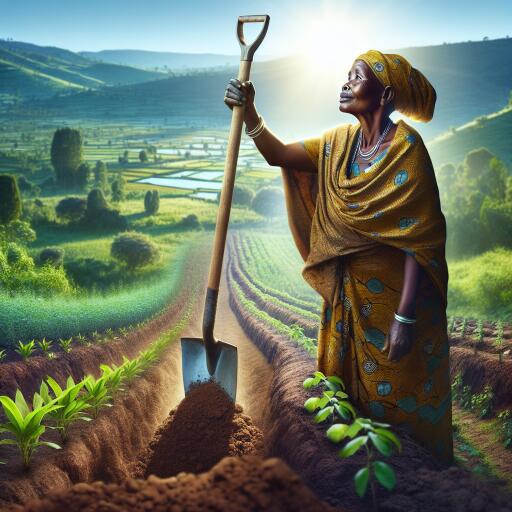
Hope and Harvest: Burundian Returnee Woman Restoring Degraded Lands for Dignity and Food Security
In the heart of Burundi, a remarkable transformation is underway, led by individuals who are turning the tide against the dual threats of land degradation and climate change. Among these changemakers is Marcelline, a woman who has returned to her homeland with the aim of reclaiming the vitality of its soil and ensuring the people’s resilience against an ever-changing climate. Her story is not just one of return but of revival—of lands, lives, and livelihoods.
Across Burundi, agricultural practices and the sustenance of its population are under duress due to the relentless march of climate change. Essential to the nation’s economy and the well-being of its citizens, agriculture faces the menace of diminishing yields brought on by increasingly degraded lands. This crisis threatens not just the economic stability but also the food security of the country, placing immense pressure on communities already grappling with vulnerability.
Marcelline’s journey is set against this backdrop of adversity. She describes how the altered patterns of rainfall, coupled with the extremes of drought, excessive rains, and flooding, compound the problem of soil erosion. Such climatic shifts derail traditional farming schedules, undermining the ability to grow food and sustain communities. The harsh reality of these environmental challenges means that without intervention, many like Marcelline might have had no choice but to flee their ancestral homes, seeking refuge from an escalating ecological crisis.
The crux of the issue lies in the degradation of land, a critical asset for a predominantly agrarian society like Burundi. It’s a problem that directly affects agricultural productivity, leaving farmers with dwindling harvests in the face of growing needs. As the integrity of the soil diminishes, so too does the capacity for self-reliance among rural families, pushing them into a cycle of poverty and food insecurity.
Marcelline’s response to these daunting challenges demonstrates the resilience and resourcefulness of those who call Burundi home. Recognizing the necessity of sustainable land management, she has become a pioneer in the practice of restoring degraded lands. Through her efforts, Marcelline not only seeks to improve the fertility of the soil but also to safeguard the agricultural traditions and food security of her community. Her work is a beacon of hope, showing that even in the face of global environmental crises, individual action can drive meaningful change.
As we witness the endeavors of Marcelline and others like her, it’s clear that the battle against land degradation and climate change is one that can be won with perseverance, innovation, and community engagement. Their work lays a foundation for a future where the people of Burundi can enjoy the fruits of their labor, free from the fear of hunger and displacement. In restoring the health of their lands, they are not only securing food but also restoring dignity and building a resilient community that can face the challenges of tomorrow.
The story of Marcelline is a powerful reminder of the human spirit’s capacity to overcome adversity and to enact positive change in the world. Her journey illuminates a path forward for others, inspiring action and hope in the quest for environmental sustainability and food security. Through collaboration, determination, and a deep connection to their land, the people of Burundi are rising to meet the challenges of their time, planting the seeds of a future defined by prosperity, security, and environmental stewardship.





Leave a Reply